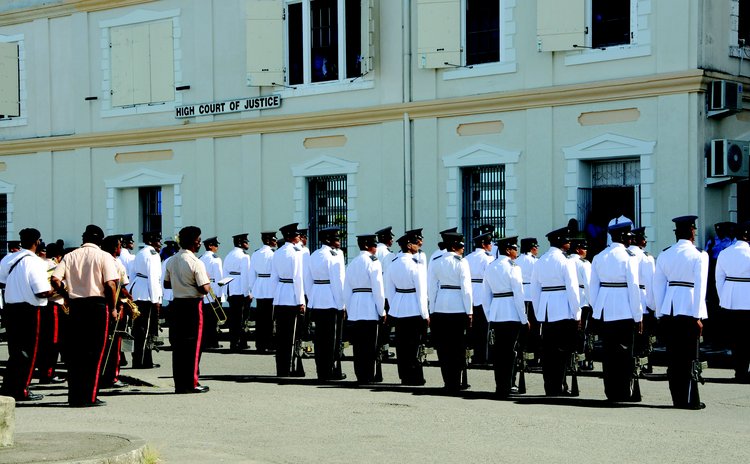Delayed justice continues to negatively impact Dominican communities

Just two weeks ago a man who was accused of killing another four years ago walked free because the prosecution could not present the findings of the pathologist who had performed the autopsy. While the family of the victim waited for justice to be delivered the doctor had left Dominica.
And on Thursday last week, the Builders and Contractors Association of Dominica said they are still waiting for a judge to decide whether the case that the Association brought against the Government of Dominica should begin. The contractors had complained to the court that the government had violated the law in awarding a contract to a Barbadian company without following the provisions of the law. In the meantime, while the court tarries, the West Bridge in Roseau, the focus of the controversy, is nearing completion.
The apparent tardiness in the delivery of decisions from the High Court, the Magistrate court as well as the Supreme Court over the years has given weight to the saying that "justice delayed is justice denied". There have been numerous such cases.
One of the most significant that had far-reaching implications for governance in Dominica was the Dual Citizenship charge against Prime Minister Roosevelt Skerrit and his Education Minister Pieter St. Jean. When the case was being discussed in the public a few years ago, a veteran lawyer opined that that case was so important that it had the potential of uplifting or damaging the integrity of the judiciary in the Organisation of Eastern Caribbean States (OECS). He was correct.
As you may recall, in 2011 Judge Gretel Thom delivered a much anticipated ruling on the issue of whether Mr. Skerrit and Mr. St. Jean would have had to present their passports to the court during the trial. The judge said no. In addition she set September 5, 2011 as the date for the trial. The ruling stunned the opposition. To the general public not schooled in the nuances of the law, Judge Thom judgment made little sense since an examination of the passports would immediately clear all doubts in the matter.
As you may be aware, the Opposition United Workers Party (UWP) had asked the court to declare that Prime Minister Skerrit and Education Minister St. Jean were not eligible to contest the December 18, 2009 general election because, contrary to Section 32 (1) (a) of the Constitution of Dominica, the two politicians held dual citizenship.
To the dismay of persons on both sides of the political spectrum, it took Judge Errol Thomas about eight months to decide whether the whole batch of election petitions that the UWP filed had any relevance in law. After describing a number of the petitions related to bribery and electoral fraud, as fishing expeditions, Judge Thomas subsequently ruled that the case against Mr. Skerrit and Mr. St. Jean should proceed to trial to determine whether these two parliamentary representatives were duly elected stewards of the people of Dominica. By that time the MPs had been sitting, legitimately or illegitimately, in the Cabinet of Prime Minister Skerrit for eight months.
After that delayed decision, in January 201(that is four months later) the petitioners asked the court to determine whether Skerrit and St. Jean should disclose all documents relevant to the case. These documents included French passports, current or cancelled, that the two ministers of government may have had in their possession.
After considering the disclosure issue for six months, Judge Thom ruled on June 7, 2011 that Skerrit and St. Jean would not have to disclose their passports. When the Judge delivered the ruling she determined that the trial should begin on September 5, 2011, almost two years after the general elections of December 2009.
It is said that six months is a life time in politics because in that fickle profession changes are not only unpredictable, they happen overnight. In other words, any number of circumstances could have caused Prime Minister Skerrit to call snap elections before the court ruled on the matter of his illegibility to contest the 2009 elections. That would have created an uncomfortable and embarrassing situation for the court because its decision would have been made null and void.
The point we wish to stress here is that when courts takes an excessive and an apparent unreasonable amount of time to decide on issues before it, the judicial system runs the risk of becoming irrelevant as a body established to settle disputes peacefully. That eventual loss of confidence in the court system could possibly lead to mob justice and vigilantism.
On the other hand persons who justify the delays of the court in deciding cases, like the dual citizenship matter and the West Bridge of Roseau contract issue, say "justice rushed is justice crushed". Although we believe that judges need as much time as possible to review issues before them, two years cannot be construed to be a justifiable period to make a decision on any case.
As the West Bridge case, the matter of the police killing of a prisoner in police custody in Portsmouth and other cases roll out slowly through the court system, the image of the judicial system would be significantly enhanced if judges and magistrates communicate to the public in simple non-legal language and offer reasons for these lengthy delays.
But unfortunately, at the moment the public has acquired the impression that the judicial system in Dominica is that impenetrable wall that you can neither get over nor see through. That impression of our court system by the general public is one of hopeless inefficiency where judges and magistrates and lawyers slowly take decisions that affect the lives of the poor and the helpless. And don't even mention the unreasonable costs of litigation. For instance, the Contractors Association say the case against government will cost it close to a quarter million dollars.




